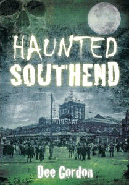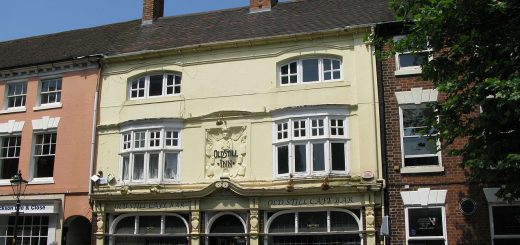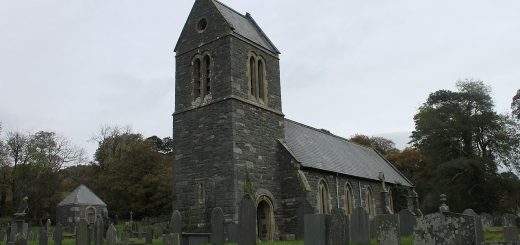Windsor Castle
The castle was built by William the Conqueror and has been part of royal life and intrigue for nearly a thousand years.
The castle has a menagerie of royal ghosts. Henry VIII haunts the cloisters of the castle, announcing his presence his lumbering footsteps and the wheezing of his breath.
 Elizabeth I is said to haunt the castle library, dressed in black with a black lace scarf. Her footsteps have been heard many times.
Elizabeth I is said to haunt the castle library, dressed in black with a black lace scarf. Her footsteps have been heard many times.
Charles I is said to haunt the Canons House, and George III haunts a small apartment where he was kept during his years of mental illness. His face has been seen peering from the room in which he was housed.




Re: Windsor Castle
The Haunted Homes and Family Traditions of Great Britain by John Ingram (1897):
Windsor, like most of our old castles, whether the residences of royalty, nobility, or commonalty, has had its apparitions. It is well known that previous to the assassination of George Villiers, Duke of Buckingham by Felton, an apparition of the Duke’s father, Sir George Villiers, had appeared to, and sent him warning of his approaching fate by, a certain person ; but it has created endless controversy that the accounts of this apparition, as recorded by Aubrey, Lord Clarendon, and others, are so various and varied. It never appears to have occurred to anyone to remark that it is just as probable that the apparition may have appeared to three or more persons, at different times and places, as to one, and that, looking at the different stories from this point of view, all the alleged discrepancies disappear, and, in fact, the various records of the marvellous story, instead of contradicting, serve to corroborate one another.
In Notes and Queries for July, 1860, Mr. Hargrave Jennings published a very curious and circumstantial account of the appearance, on three separate occasions, of an apparition of Sir George Villiers to one Parker, formerly a servant of Sir George, and at that time in the employment of his son, the Duke. This letter, originally published some few years after the Duke’s death, is of considerable interest ; but as it, in many respects, parallels other and less accessible accounts, it may be passed over in favour of the story as told by
Lord Clarendon and Aubrey. According to the account furnished by the former in his History of the Rebellion. the apparition of Sir George Villiers appeared to an officer in the King’s Wardrobe, in Windsor Castle. This man, says Clarendon, was of a good reputation for honesty and discretion, and at the time referred to was about fifty years of age.
"He had in his youth been bred in a school in the parish where Sir George Villiers, the father of the Duke, lived, and had been much cherished and obliged, in that season of his age, by the said Sir George, whom afterwards he never saw.
"About six months before the miserable end of the Duke of Buckingham, about midnight, this man being in his bed at Windsor, where his office was, and in good health, there appeared to him, at the side of his bed, a man of a very venerable aspect, who drew the
curtains of his bed, and, fixing his eyes upon him, asked him if he knew him.
"The poor man, half dead with fright and apprehension, being asked the second time whether he remembered him, and having in that time called to his memory the presence of Sir George Villiers, and the very clothes he used to wear, in which at that time he seemed to be habited, he answered him that he thought him to be that person. He replied he was in the right, he was the same, and that he expected a service from him, which was, that he should go from him to his son, the Duke of Buckingham, and tell him if he did not somewhat to ingratiate himself with the people, or at least to abate the extreme malice which they had against him, he would be suffered to live but a short time.
"After this discourse he disappeared, and the poor man (if he had been at all waking), slept very well till morning, when he believed all this to be a dream, and considered it no otherwise.
"The next night, or shortly after, the same person appeared to him again, in the same place, and about the same time of the night, with an aspect a little more severe than before, and asked him whether he had done as he required of him ; and perceiving he had not, gave him very severe reprehensions, told him he expected more compliance from him, and that, if he did not perform his commands, he should enjoy no more peace of mind, but should always be pursued by him, upon which he promised him to obey.
"But the next morning, waking out of a good sleep, though he was exceedingly perplexed with the lively representation of all particulars to his memory, he was willing still to persuade himself that he had only dreamed, and considered that he was a person at such a distance from the Duke, that he knew not how to gain admission to his presence, much less had any hope of being believed in what he should say ; so he spent some time in thinking what he should do, and in the end he resolved to do nothing in the matter.
"The same person appeared to him the third time, with a terrible countenance, and bitterly reproached him for not performing what he had promised to do. The poor man had by this time recovered the courage to tell him that, in truth, he had deferred the execution of his commands, upon considering how difficult a thing it would be for him to get any access to the Duke, having acquaintance with no person about him ; and if he should obtain admission to him, he should never be able to persuade him that he was sent in such a manner; that he should at least be thought to be mad, or to be set on and employed by his own, or the malice of other men, to abuse the Duke, and so he should be sure to be undone.
"The apparition replied, as he had done before, that he should never find rest till he had performed what he required, and therefore he were better to despatch it ; that the access to his son was known to be very easy, and that few men waited long for him. As for his gaining credit, he would tell him two or three particulars, which he charged him never to mention to any person living but to the Duke himself, and he should no sooner hear them but he should believe all the rest he said ; and so, repeating his threats, he left him.
"In the morning the poor man, more confirmed by the last appearance, made his journey to London, where the Court then was. He was very well known to Sir Ralph Freeman, one of the Masters of Requests, who married a lady that was nearly allied to the Duke, and was himself well received by him. To him this man went, and though he did not acquaint him with all the particulars, he said enough to let him know there was something extraordinary in it, and the knowledge he had of the sobriety and discretion of the man made the more impression on him. He desired that, by his means, he might be brought to the Duke, in such a place and in such a manner as should be thought fit, affirming that he had much to say to him, and of such a nature as would require much privacy, and some time and patience in the hearing.
"Sir Ralph promised that he would first speak to the Duke of him, and then he should understand his pleasure. Accordingly, the first opportunity, he did inform him of the reputation and honesty of the man, and then what he desired, and of all he knew of the matter.
"The Duke, according to his usual openness and condescension, told him that he was the next day early to hunt with the King, that his horses should attend him at Lambeth bridge, where he should land by five o’clock in the morning, and, if the man attended him there at that hour, he would walk and speak with him as long as should be necessary.
"Sir Ealph carried the man with him the next morning, and presented him to the Duke at his landing, who received him courteously, and walked aside in conference near an hour ; none but his own servants being at that hour in that place, and they and Sir Ealph at such a distance that they could not hear a word, though the Duke sometimes spoke loud, and with great commotion, which Sir Ralph the more easily perceived, because he kept his eyes always fixed upon the Duke, having procured the conference upon somewhat he knew there was of extraordinary.
"The man told him, in his return over the water, that when he mentioned those particulars which were to gain him credit (the substance whereof, he said, he durst not impart to him), the Duke’s colour changed, and he swore he could come at that knowledge only by the Devil, for that those particulars were only known to himself, and to one person more, who he was sure would never speak of it.
"The Duke pursued his purpose of hunting, but was observed to ride all the morning with great pensiveness, and in deep thoughts, without any delight in the exercise he was upon ; and before the morning was spent, he left the field and alighted at his mother’s lodgings in Whitehail, with whom he was shut up for the space of two or three hours, the noise of their discourse frequently reaching the ears of those who attended in the next rooms. And when the Duke left her, his countenance appeared full of trouble, with a mixture of anger a countenance that was never before observed in him in any conversation with her, towards whom he had a profound reverence ; and the Countess herself (for though she was married to a private gentleman, Sir Thomas Compton, she had been created Countess of Buckingham shortly after her son had first assumed that title) was, at the Duke’s leaving, found overwhelmed in tears, and in the highest agony imaginable.
"Whatever there was in all this," says Clarendon, "it is a notorious truth, that when the news of the Duke’s murder (which happened within a few months after), was brought to his mother, she seemed not in the least degree surprised, but received it as if she had foreseen it ; nor did afterwards express such a degree of sorrow as was expected from such a mother, for the loss of such a son."
This is the story as repeated by the grave historian of the so-called "Rebellion," with the assurance that it is "upon a better foundation of credit than usually such discourses are founded upon." Other versions of the mysterious affair were published some few years after the Duke of Buckingham’s murder ; and although the discrepancies in them have never been explained, still there has been a sufficient similarity in the leading features of the narratives to cause most people to imagine that they were all derived from one source. But this does not necessarily follow. If the apparition appeared to different people and at different times a d it does not seem more wonderful that it should have manifested itself to two or more individuals than to one the variations in the tales told of its appearance are readily explicable. Lilly, the astrologer, notoriously published a false version of the story ; and it was for that reason only that Sir Edmund Wyndham, who was fully acquainted with the facts of the case, gave the narrative that ultimately passed into the hands of Aubrey, the antiquary, and by him is thus told :
"To one, Mr. Towes, who had been school-fellow with Sir George Villiers, the father of the first Duke of Buckingham (and was his friend and neighbour), as he lay in his bed awake (and it was daylight), came into his chamber the phantom of his dear friend, Sir George Villiers. Said Mr. Towes to him, ‘ Why, you are dead, what make you here ? ‘ Said the knight, ‘ T am dead, but cannot rest in peace for the wickedness and abomination of my son George, at Court. I do appear to you, to tell him of it, and to advise and dehort him
from his evil ways.’ Said Mr. Towes, * The Duke will not believe me, but will say that I am mad, or dote. Said Sir George, ‘ Go to him from me, and tell him by such a token (a mole) that he had in some secret place> which none but himself knew of.’ According, Mr. Towes went to the Duke, who laughed at his message. At his return home, the phantom appeared again, and told him that the Duke would be stabbed a quarter of a year after ; ‘ and the warning which you will have of your death, will be, that your nose will fall a bleeding.’ All which accordingly fell out so.
"This account I have had in the main," says Aubrey, " from two or three ; but Sir William Dugdale affirms what I have here taken from him to be true, and that the apparition told him of several things to come, which proved true, e.g. of a prisoner in the Tower that shall be honourably delivered. This Mr. Towes had so often the ghost of his old friend appear to him, that it was not at all terrible to him. He was Surveyor of the Works at Windsor, by the favour of the Duke. Being then (i.e. at that time) sitting in the hall, he cried out,
‘ The Duke of Buckingham is stabbed ! ‘ He was stabbed that very moment."
"This relation Sir William Dugdale had from Mr. Pine, neighbour to Mr. Towes ; they were sworn brothers." Sir Edmund Wyndham married the daughter of Mr. Pine, and possessed a large roll of manuscript wherein Mr. Towes had recorded the particulars of his conferences with the apparition.
Re: Windsor Castle
HAUNTED CHURCHES by ELLIOTT O’DONNELL (1939)
THE Deanery at Windsor Castle possesses a very well authenticated ghost. It is frequently heard walking along a passage, opening a door and descending four stairs, with three distinct steps. A lady, who visited the Deanery comparatively recently and heard nothing of the ghost, told the occupants of the house that the passage was haunted by a figure in grey, too vague and shadowy, however, for her to determine whether it was the phantom of a man or woman.
The cloisters adjoining the Deanery are believed to be haunted, and by a ghost bearing a striking resemblance to the portrait of Henry VIII in the National Portrait Gallery. It is occasionally seen but more often heard perambulating the Dean and Canon’s cloisters, groaning and moaning, as if in direst anguish. If it really is the earth-bound spirit of Henry VIII one cannot be surprised, or help being somewhat satisfied, that such a monster as the Bluff Monarch should be doomed to some kind of lasting punishment for his many cruelties.